Industry and Innovation
- Home
- Research
- Research Impact Showcase
- Industry and Innovation
Read about our Industry and Innovation Research Impact Case Studies below.
-
REF Impact Case Study 2021
- Submitted to: 12 – Engineering
- Submitted title: Improving the Inspection Method for Metal Castings and Developing the Skills of Indian Foundry Workers.
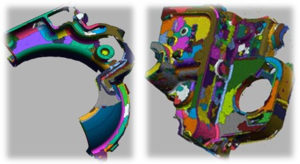
A 3-D CAD model of a converter housing made from austempered ductile iron obtained using a laser scanner. The colour code shows the error difference between the original CAD model and the reconstructed CAD model. The grey regions are deemed to be a good fit.
Summary
Research undertaken by Dr Abdeldjalil Bennecer and Professor Philip Picton is aimed at addressing the lack of awareness and training among foundry workers in India in implementing inspection technologies that meet global quality standards in steel production. With casting production in India anticipated to triple over the next 10 years, and employment in this industry doubling over the next four years, it is critical that foundry workers in India are suitably trained to meet global standards.
UON researchers in collaboration with researchers from the Hindustan Institute of Science and Technology (HIST) have introduced a novel 3-D ultrasonic method of measuring the dimensions, profile, material integrity, defects, and nodularity of cast components to foundries in India. The development of training materials, and workshops on how to implement non-destructive testing has led to 17 small and medium enterprises changing the process of testing casting components. By enabling more accurate measuring systems, the research has led to a decrease in the number of rejected components reducing environmental waste and increased business capacity by reducing downtime.
Researchers
- Dr Abdeldjalil Bennecer
- Professor Philip Picton
-
REF Impact Case Study 2021
- Submitted to: 12 -Engineering
- Submitted title: New Design Guidelines to Optimise the Dynamic Performance of Vertical Transportation Systems in High-Rise Projects Worldwide
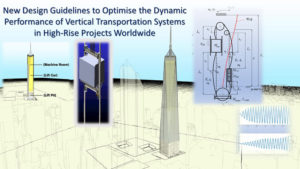
Robust algorithms developed to analyse and control the dynamic behaviour and interactions transformed the Engineering practice and capacity of designing safety standard-compliant high-rise lift installations.
Summary
In partnership with ThyssenKrupp Elevator, research led by Professor Kaczmarczyk, has developed complex algorithms to analyse and control the dynamic behaviour of lifts (vertical transport systems) in tall buildings. The research has developed guidelines to solve the identified and complex design problems in tall buildings that are susceptible to large sway motions when subjected to wind loading and long-period seismic movement. In a scenario where a building is subjected to fundamental structural resonance, low frequency sway motions of the building take place. This can affect passenger ride quality and result in a high level of dynamic stress. This research based on experimental studies and rigorous testing led to the development of theoretical models of entire vertical transport systems to predict the impact of resonance.
Bespoke simulation software was developed to measure the impact of building movement on lift systems. As a result, this have led to new design guidelines and strategies to minimise the effects of adverse dynamic movement on lift installations without compromising structural integrity and the safety of the system in place. The research and latest generation of the building sway software has resulted in new patents and provided ThyssenKrupp Elevator with exclusive rights to develop effective control strategies. Patents have been awarded in Europe and the Unites States.
Researchers
- Professor Stefan Kaczmarczyk
- Professor Philip Picton
- Dr Huijuan Su
-
REF Impact Case Study 2021
- Submitted to: 17 – Business and Management Studies
- Submitted title: Driving Policy Innovation for the UK Government in the development of an outcomes focused public service innovation market.
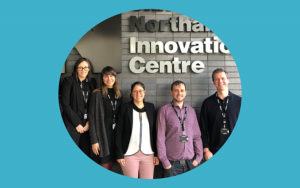
Summary
The Institute for Social Innovation and Impact (ISII) has conducted research to support disadvantaged individuals and those organisations that work with them. This research, led by Professor Richard Hazenberg, supported government policy development on how best to design, commission, fund and deliver innovations in public service focussed on service-user outcomes. Working in collaboration with the Cabinet Office, HM Treasury and Big Issue Invest, ISII provided analysis of the social investment market and its impact on Voluntary, Community and Social Enterprise organisations, theoretical understanding of what constitutes social value and frameworks for measuring social impact.
The research has supported innovations in public policy, specifically around social investment, impact measurement and outcomes-based commissioning. It has been key in supporting the Cabinet Office and HM Treasury to utilise evidence in their policy innovations. This includes supporting the government in the development of the social investment market and Social Impact Bonds, the creation of outcomes-based commissioning, and the use of Social Impact Measurement (SIM) to assess these.
Researchers
-
REF Impact Case Study 2021
- Submitted to: 17 – Business and Management Studies
- Submitted title: Enhancing business collaboration between UK and Chinese regions

Summary
Associate Professor Shaowei He has focussed on research that explores the rise of Chinese businesses and the relationships they develop with overseas partners. Analysis of the political, institutional, and social factors that shape these business relationships has resulted in stronger collaborations with between the UK and Chinese regions for UK and enabled key stakeholders (UK members of parliament, local authorities, and businesses) to better understand the context and practice of working effectively with Chinese businesses and regions.
There has been growing interest among UK local authorities and their communities to increase business with China post Brexit. As a result of He’s extensive knowledge on Chinese firms and his in-depth study of Chinese acquisitions in the UK, He was invited to provide evidence to a Parliamentary inquiry (2020) into foreign investment into UK companies and Britain’s relationship with China. He has also supported two local authorities to develop specific links with regions in China where they have common business interests. The research advocates the need for UK government and businesses, who receive investment from China, to look beyond the immediate financial investment gains and focus more on the innovations that Chinese firms may bring.
Researchers
-
REF Impact Case Study 2021
- Submitted to: 32 – Art and Design: History, Practice and Theory
- Submitted title: Embedding user-centred design into the development of innovative medical devices
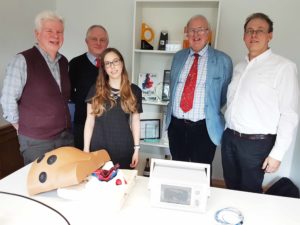
Pictured from left, Steve McGonigal, Stewart Forbes from Lightpoint, and UON’s Francesca Oldfield, Tony Denman, Friedmann Schaber.
Summary
UON’s recent Knowledge Transfer Partnership with Lightpoint Medical has led to innovations in the company’s design process for their medical devices. Researchers at UON, led by Dr Friedemann Schaber, have worked to embed new operating procedures into Lightpoint Medical which focus on user centred design. This has resulted in the prototype for SENSEI, a new device for radio guided laparoscopic surgery in cancer patients which is aimed at improving cancer treatment and outcomes through precision guided surgery.
Research at UON supported has supported the introduction of a new standard operating procedure for Lightpoint Medical using research methodologies that integrated a high level of user engagement in the product design process and establishing a user interaction framework to guide the future development of the company’s products. As a result, Lightpoint have increased investment in clinical trials for SENSEI®, and additional research and development of future versions of the technology by £1,350,000.
Researchers
-
REF Impact Case Study 2021
- Submitted to: 21 – Sociology
- Submitted title: Increasing Employability for People Experiencing Multiple Disadvantage
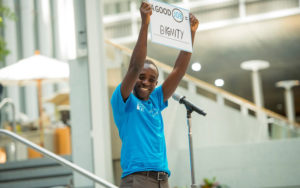
Summary
Associate Professor Claire Paterson-Young and Professor Richard Hazenberg in the Institute of Social Innovation and Impact (ISII) have conducted research on the psychological effects of unemployment and the role of the third sector in delivering employability enhancement programmes for socially excluded individuals. Their research focused on the impact of employability programmes for people experiencing multiple disadvantages including unemployment, economic inactivity, young people not in employment, and those experiencing mental health problems.
The team’s research established the negative effects unemployment has on an individual’s psychological state and well-being and demonstrated that designing programmes that deal with these factors is essential to improving outcomes. The £1.3m project was funded by the European Social Fund/Big Lottery and delivered alongside Goodwill Solutions CIC and 17 other voluntary organisations, with the aim of supporting disadvantaged individuals to gain employment through work-based training and emotional support.
Researchers